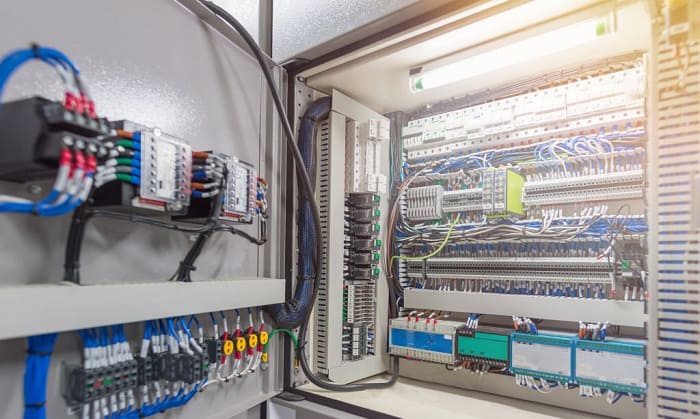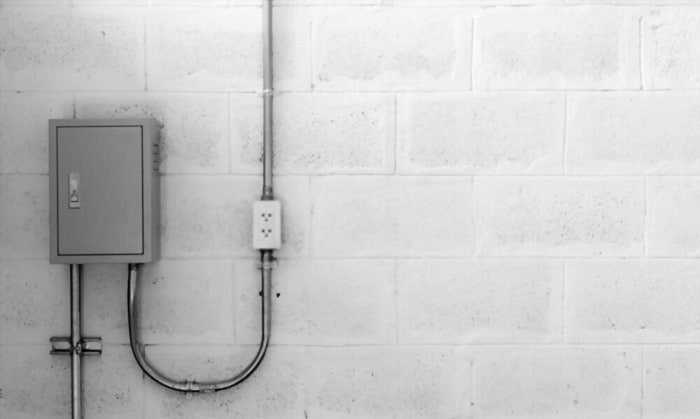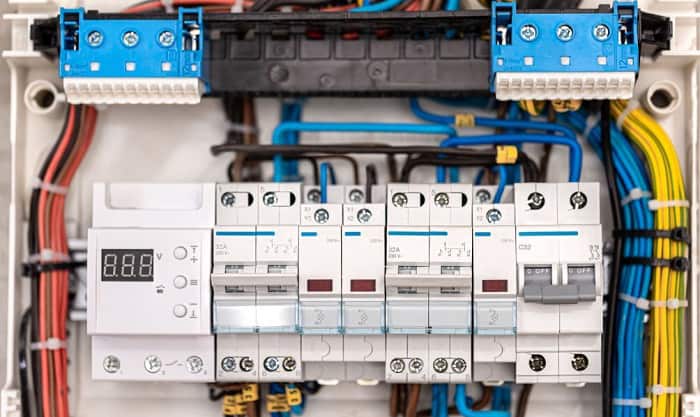A service panel functions by maintaining the proper distribution of power throughout a property. But what is the difference between an indoor vs outdoor electrical panel?
Indoor and outdoor electrical service panels have their distinct differences and similarities. But note that an indoor breaker box isn’t always the best for all setups. The same notion also exists for an outdoor panel.
It’s essential to look at different factors in choosing the ideal location for your breaker box. Continue reading as you learn about this object in greater detail.
Table of Contents
Comparison
Installing a service panel without looking at specific elements may lead to problems with the property’s electrical setup. Take note of the following factors to choose the best location for your breaker box.
Durability
Placing an electrical panel box outside generally requires the assembly to contain more durable components than its indoor counterpart. Perhaps one of the reasons is that an outside breaker box will be more susceptible to the weather than an inside panel.
Generally, indoor enclosures only have a National Electrical Manufacturer Association (NEMA) Type 1 rating, whereas outdoor models are Type 3. It’s also important to note that many outdoor panels handle heavy loads, denoting the need for a tougher box.
Note that the NEMA classification is the toughness score of the panel enclosure. Specifically, a higher rating means a more durable case that can withstand more risks than lower-rating variants.
However, an outdoor service panel may have a shorter lifespan than an indoor circuit breaker box. Outdoor panels often only last about 30 years while indoor variants might provide sufficient service for up to 40 years.
Accessibility
An indoor electrical panel might be safer to access than an outdoor circuit breaker box. However, that might not always be the case, for optimal accessibility still depends on the property’s design and layout.
The ideal location for an electrical service panel should follow the guidelines designated by the National Electrical Code (NEC) Section 110.26.
That particular segment mentions that all electrical equipment, including circuit breaker panels, should possess a clearance of at least 30 x 36 inches around them for the assembly to be accessible without producing significant hazards.
Other requirements imposed by the NEC to make breaker boxes as accessible as possible are the following:
- The central grip of the circuit breaker box shouldn’t exceed 6 feet and 7 inches from the floor.
- Keep other objects, particularly flammable furniture away from the breaker panel.
- Ensure that the breaker box’s area has suitable lighting, promoting convenient and safe circuit breaker repairs and replacements when needed.
Efficiency
Take note that efficiency typically means the ability to produce a goal with minimal resource expenditure. On that note, an exterior electrical panel might not be more efficient than its indoor counterpart, and vice versa.
In particular, an efficient service panel should supply users with sufficient accessibility, safety, and durability to provide the least amount of risks possible.
Also, calling an electrical service panel ‘efficient’ generally means looking at the circuit breakers inside the enclosure. Keep in mind that a breaker box that promotes efficiency should have a balanced load setup.
Remember, don’t install circuit breakers into your service panel randomly. Instead, ensure that Lines 1 and 2 have roughly the same circuit breaker numbers. Otherwise, overloads or short circuits may occur.
Safety
A breaker box located outdoors might have similar levels of safety when compared to its indoor equivalent. Both should be safe to access and work with if users follow certain guidelines provided by the NEC.
For instance, if you’re planning to install an indoor electrical service panel, don’t place it in locations like bathrooms and cramped clothes closets. Also, it’s best to put the breaker box in an area that’s as close to a service entrance as possible.
You should also think about certain conditions that can affect the safety of your electrical setup. For instance, if your neighborhood is prone to contracting fires, it might be wise to install the breaker box outside rather than inside.
With an exterior electrical panel, firefighters can shut off the property’s main power from the outside easily. Not only will this location help prevent the spread of fire in your home, but it should also reduce the risks of injuries for emergency response workers.
Can You Put an Electrical Panel Outside?
It’s possible to install an electrical panel outside. But you need to pay attention to certain factors before deciding on this installation location.
Some of the things to think about are:
- Outdoor temperature: Place the box away from direct sunlight to avoid ruining the wires and other connections.
- Theft: Some people might break into the property, tinkering and/or stealing the service panel and/or its breakers.
- Cleanliness: Certain locales might be dustier than others, having small particulates that may cause harm to the panel.
Can a House Have Two Electrical Panels?
A house can have two electrical service panels. But the two main circuit breakers should be adjacent to each other, according to Section 230.72(A) of the NEC. Also, both panels should have a dedicated utility meter.
Conclusion
Now that you’ve reached the end of this post, you should know the differences between an indoor vs outdoor electrical panel. If you’re not in a hurry, take the time to think about the different factors above to install your breaker box at an ideal location.
Remember, consider the durability, accessibility, efficiency, and safety of your setup. That way, you can install the panel without worrying about various hazards that you might otherwise encounter with it.
Related Comparisons you may be interested in:

I am Andrew Wright. With 8 years of experience designing, installing, and maintaining electrical power systems. I love my job, and I have always wanted to offer others the necessary help so they can take care of their houses.



